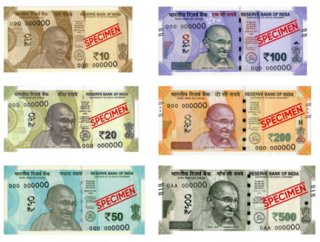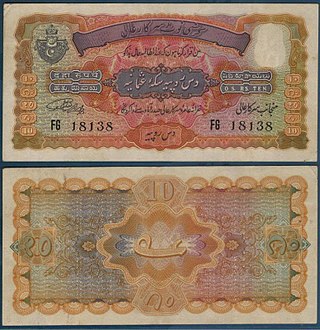Related Research Articles

A gold standard is a monetary system in which the standard economic unit of account is based on a fixed quantity of gold. The gold standard was the basis for the international monetary system from the 1870s to the early 1920s, and from the late 1920s to 1932 as well as from 1944 until 1971 when the United States unilaterally terminated convertibility of the US dollar to gold, effectively ending the Bretton Woods system. Many states nonetheless hold substantial gold reserves.

The economic history of Argentina is one of the most studied, owing to the "Argentine paradox". As a country, it had achieved advanced development in the early 20th century but experienced a reversal relative to other developed economies, which inspired an enormous wealth of literature and diverse analysis on the causes of this relative decline. Since independence from Spain in 1816, the country has defaulted on its debt nine times. Inflation has often risen to the double digits, even as high as 5000%, resulting in several large currency devaluations.

A reserve currency is a foreign currency that is held in significant quantities by central banks or other monetary authorities as part of their foreign exchange reserves. The reserve currency can be used in international transactions, international investments and all aspects of the global economy. It is often considered a hard currency or safe-haven currency.

Black Wednesday, or the 1992 sterling crisis, was a financial crisis that occurred on 16 September 1992 when the UK Government was forced to withdraw sterling from the (first) European Exchange Rate Mechanism , following a failed attempt to keep its exchange rate above the lower limit required for ERM participation. At that time, the United Kingdom held the Presidency of the Council of the European Union.
The Hong Kong dollar is the official currency of the Hong Kong Special Administrative Region. It is subdivided into 100 cents or 1000 mils. The Hong Kong Monetary Authority is the monetary authority of Hong Kong and the Hong Kong dollar.

The Bretton Woods system of monetary management established the rules for commercial relations among the United States, Canada, Western European countries, and Australia among 44 other countries after the 1944 Bretton Woods Agreement. The Bretton Woods system was the first example of a fully negotiated monetary order intended to govern monetary relations among independent states. The Bretton Woods system required countries to guarantee convertibility of their currencies into U.S. dollars to within 1% of fixed parity rates, with the dollar convertible to gold bullion for foreign governments and central banks at US$35 per troy ounce of fine gold. It also envisioned greater cooperation among countries in order to prevent future competitive devaluations, and thus established the International Monetary Fund (IMF) to monitor exchange rates and lend reserve currencies to nations with balance of payments deficits.

The Indian rupee is the official currency in India. The rupee is subdivided into 100 paise. The issuance of the currency is controlled by the Reserve Bank of India. The Reserve Bank manages currency in India and derives its role in currency management on the basis of the Reserve Bank of India Act, 1934.
In macroeconomics and modern monetary policy, a devaluation is an official lowering of the value of a country's currency within a fixed exchange-rate system, in which a monetary authority formally sets a lower exchange rate of the national currency in relation to a foreign reference currency or currency basket. The opposite of devaluation, a change in the exchange rate making the domestic currency more expensive, is called a revaluation. A monetary authority maintains a fixed value of its currency by being ready to buy or sell foreign currency with the domestic currency at a stated rate; a devaluation is an indication that the monetary authority will buy and sell foreign currency at a lower rate.
Petrocurrency is a word used with three distinct meanings, often confused:
- Dollars paid to oil-producing nations —a term invented in the 1970s meaning trading surpluses of oil-producing nations.
- Currencies of oil-producing nations which tend to rise in value against other currencies when the price of oil rises.
- Pricing of oil in US dollars: currencies used as a unit of account to price oil in the international market.
Eurocurrency is currency held on deposit outside its home market, i.e., held in banks located outside of the country which issues the currency. For example, a deposit of US dollars held in a bank in London, would be considered eurocurrency, as the US dollar is deposited outside of its home market.
The Convertibility plan was a plan by the Argentine Currency Board that pegged the Argentine peso to the U.S. dollar between 1991 and 2002 in an attempt to eliminate hyperinflation and stimulate economic growth. While it initially met with considerable success, the board's actions ultimately failed. The peso was only pegged to the dollar until 2002.

The sterling area was a group of countries that either pegged their currencies to sterling, or actually used sterling as their own currency.

Susan Strange was a British scholar who was "almost single-handedly responsible for creating international political economy." Notable publications include Sterling and British Policy (1971), Casino Capitalism (1986), States and Markets (1988), The Retreat of the State (1996), and Mad Money (1998).

Monetary hegemony is an economic and political concept in which a single state has decisive influence over the functions of the international monetary system. A monetary hegemon would need:
Benjamin Jerry Cohen is the Louis G. Lancaster Professor of International Political Economy at the University of California, Santa Barbara. At UCSB, where he has been a member of the faculty since 1991, he teaches undergraduate and graduate courses on international political economy.
An international monetary system is a set of internationally agreed rules, conventions and supporting institutions that facilitate international trade, cross border investment and generally the reallocation of capital between states that have different currencies. It should provide means of payment acceptable to buyers and sellers of different nationalities, including deferred payment. To operate successfully, it needs to inspire confidence, to provide sufficient liquidity for fluctuating levels of trade, and to provide means by which global imbalances can be corrected. The system can grow organically as the collective result of numerous individual agreements between international economic factors spread over several decades. Alternatively, it can arise from a single architectural vision, as happened at Bretton Woods in 1944.
The London Gold Pool was the pooling of gold reserves by a group of eight central banks in the United States and seven European countries that agreed on 1 November 1961 to cooperate in maintaining the Bretton Woods System of fixed-rate convertible currencies and defending a gold price of US$35 per troy ounce by interventions in the London gold market.

Currency war, also known as competitive devaluations, is a condition in international affairs where countries seek to gain a trade advantage over other countries by causing the exchange rate of their currency to fall in relation to other currencies. As the exchange rate of a country's currency falls, exports become more competitive in other countries, and imports into the country become more and more expensive. Both effects benefit the domestic industry, and thus employment, which receives a boost in demand from both domestic and foreign markets. However, the price increases for import goods are unpopular as they harm citizens' purchasing power; and when all countries adopt a similar strategy, it can lead to a general decline in international trade, harming all countries.
The devaluation of sterling in 1949 was a major currency crisis in the United Kingdom that led to a 30.5% devaluation of sterling from $4.04 per pound to $2.80. Although the devaluation was made in the United Kingdom, over 19 countries had currencies pegged to sterling and also devalued.
The 1967 sterling devaluation was a devaluation of sterling from $2.80 to $2.40 per pound on 18 November 1967. It ended a long sterling crisis that had started in 1964 with the election of Labour in the 1964 United Kingdom general election, but originated in the balance of payments crises of the preceding Conservative government.
References
- 1 2 "Catherine Schenk". Chatham House – International Affairs Think Tank. Retrieved 2022-11-04.
- ↑ "Professor Catherine R Schenk". www.history.ox.ac.uk. Retrieved 2022-11-04.
- ↑ "Britain and the Sterling Area: From Devaluation to Convertibility in the 1950s". Routledge & CRC Press. Retrieved 2022-11-04.
- ↑ Schenk, Catherine R. (2010). The Decline of Sterling: Managing the Retreat of an International Currency, 1945–1992. Cambridge: Cambridge University Press. ISBN 978-0-521-87697-1.
- ↑ "Splendid isolation? Most people prefer globalisation". Financial Times. 2022-07-28. Retrieved 2022-11-04.
- ↑ Schenk, Catherine R. (2002-10-01). "Banks and the emergence of Hong Kong as an international financial center". Journal of International Financial Markets, Institutions and Money. 12 (4): 321–340. doi:10.1016/S1042-4431(02)00017-3. ISSN 1042-4431.
- ↑ Kuper, Simon (2022-07-28). "Splendid isolation? Most people prefer globalisation". Financial Times. Retrieved 2023-11-10.